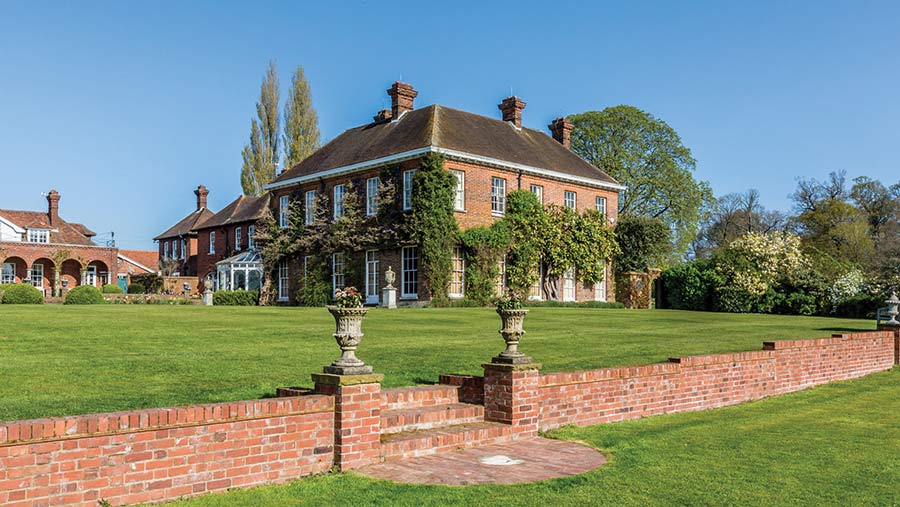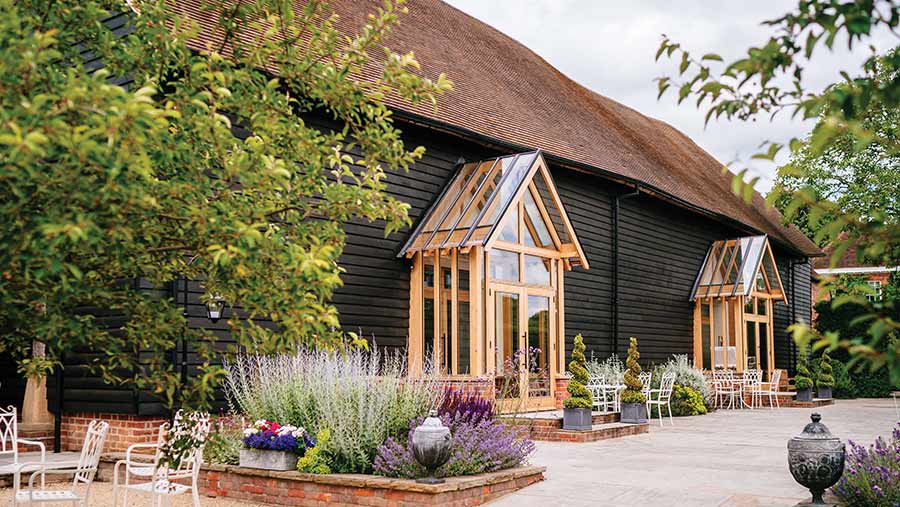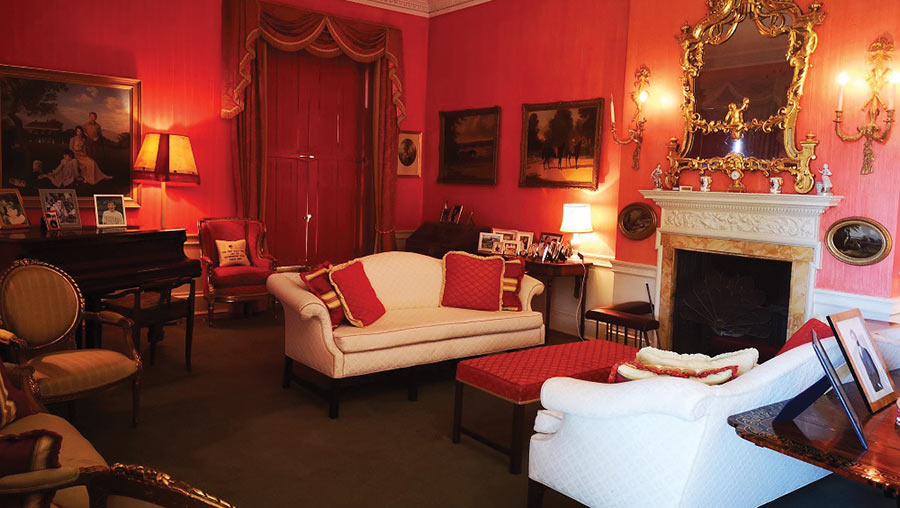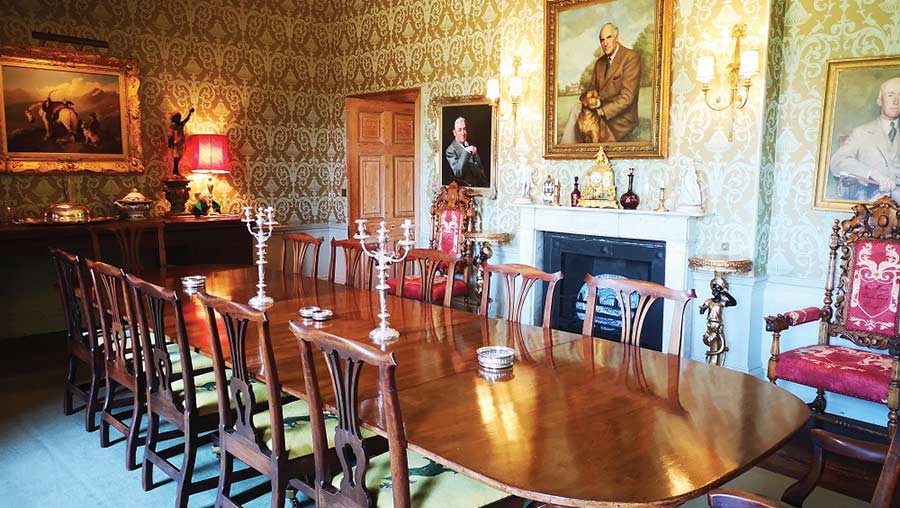So you want to… let your farm as a film location?
 Micklefield Hall © Micklefield Hall
Micklefield Hall © Micklefield Hall Jamie and Anna Rankin have been hosting film shoots on their farm for 21 years. The couple run a diversified business in Hertfordshire from Micklefield Hall, a Georgian manor that also hosted dozens of weddings, parties and events every year until the onset of the coronavirus pandemic.
When brides are not walking down the aisle, the couple regularly turn over their 141ha estate to actors, cameramen and directors keen to film in the grand interior of the house, the old barns that surround it, or the fields and woodland beyond.
The couple say offering a film location is a useful additional income stream and that a big house is not essential, with location scouts drawn to places as variable as the topics needing to be filmed.

© Micklefield Hall
Hosting David Attenborough and the team working on the television programme, A Life on Our Planet, was one of the highlights of their 21-year stint hosting film shoots including children’s television, dramas and commercials.
However, they emphasise that this is really only ever an option as a sideline, as you cannot build yourself up as a business in the same way as a shop or an event space.
“Our main business is weddings,” says Jamie. “You can plan and market that and make it happen. Films you can’t.
“You are at the whim of a director. You deal with scouts. They will recommend you to the director of the film and it is very much their view as to whether you get selected. It is nice to have, but not a business proposition.”
The Rankins’ advice for setting up as a film location
1. Get a professional photographer to snap what you have to offer and have a good website to showcase the images to scouts.
It is important to be honest about what you have, says Anna, so people don’t waste time coming to a place that is not suitable.
2. Have lots of parking. If you are lucky enough to host a large shoot, such as a film, you’ll need to have room for as many as 40 lorries and caravans that bring in the stacks of equipment and temporary accommodation for the talent to retire to between takes.

Micklefield Hall drawing room © Micklefield Hall
3. Don’t be precious. Film location owners sign over the right to access a plot of land or a building on the understanding that a crew can make substantial alterations to the way it looks.
“You have to be prepared for your whole house to be turned upside down and not worry,” Jamie warns.
“You have to be relaxed and not hang over their shoulders – they will hate that.”
This goes beyond laying cables and equipment everywhere – rooms can be reconfigured and walls repainted – on the understanding that when they leave it will be put back exactly as it was found.
4. Scrutinise every line of the contract – and be prepared to haggle.
“I always say ask them what they are going to offer you first,” says Anna. “You can always go down, but not up.”
They charge up to £4,000 a day for the largest film crews to access the house and grounds, having slowly increased the price as they got more established.
“You have to be prepared to negotiate, particularly when they offer you more than one day,” she says.
“You have both got to be comfortable with the figure. You don’t want them to arrive and then be resentful.”

© Micklefield Hall
A good contract should be very clear on the terms, particularly how many hours of shooting it covers and what happens if the crew exceed the time allocated.
They have an increasing scale of payments which charges double time if it is an elongated day and can escalate to triple time if additional days are needed.
How to attract interest and protect your property
Rural properties of all shapes and sizes, and in all manner of locations, the grand and the not so grand, are in demand as locations for film and TV, says Martyn Dobinson, a partner at accountancy and advice firm Saffery Champness.
He said the first step for businesses wanting to get noticed is to register with a location agency.
These will normally host a photographic portfolio for free that can be perused by scouts, with the location agency taking a commission for every listing that results in a contract.
Insurance
Mr Dobinson also cautions location owners to carefully scrutinise contracts with production companies before signing on the dotted line, particularly the terms around access and damage.
Wording should clearly state what restrictions on access there are, including what areas are off limits for filming.
“The production company will have its own liability insurance, which should cover any accidental damage to your property or contents,” he says.
“However, it’s important to ensure that such cover is in place before any action commences, and to get a copy of the production company’s insurance documentation.
“Where agreed changes will be made to your property, such as changes to decoration, clarify beforehand that any costs of making good or remedial work will be covered by the production company.”
Public liability
A location host will need to make sure they have other forms of insurance up to scratch, says NFU Mutual farm specialist Chris Walsh.
“As well as being a key requirement for the production company, it is vital that you have public liability insurance in place.
“Speak to your insurer first to check you have cover under your farm policy or if it needs to be added – make sure to seek advice on adequate indemnity limits to ensure you are fully protected.
Business owners should also consider the insurance they have in place for vehicles and generators, in case they are required by the crew.
“Check the production company’s credentials and that they have public liability cover in place.
“The production company’s cover does not remove the need for you to have cover too; you still have responsibilities to minimise and manage risks, as you would with anyone coming on site,” says Mr Walsh says.
In some cases it may also be appropriate to use risk management or property specialists to highlight hazards on the property for visitors and take action to minimise any threats, he says.
Exposure
Businesses that already operate other public-facing enterprises may find that their appeal increases if they become favourably associated with a popular film or TV show.
This is the case with The Potter’s Cottage, in County Down, Northern Ireland, which provided part of the farmyard backdrop of Winterfell in the blockbuster Game of Thrones television series.
It is just one of a number of National Trust holiday properties that the charity advertises on the basis of it having been a film location.
However, as well as a sprinkling of stardust and an uplift in property values, businesses also need to be mindful of the negative effects the disruption of filming may have, says Mr Dobinson.
Consider early on the implications of increased visitor numbers resulting from the exposure, particularly for working farms and estate.
There can also be tax implications from letting your property as a filming location, and not just in increased taxable income, says Mr Dobinson.
“Any tax-deductible costs should be carefully recorded and If a property is let regularly for filming use, there could also be inheritance tax implications.
“Letting for filming, as opposed to using a property in a trade, for example, could pose issues with regards to the availability of business property relief.”
The structure of the contract and level of services provided by owners and their staff should be carefully considered in those cases, he warns.
